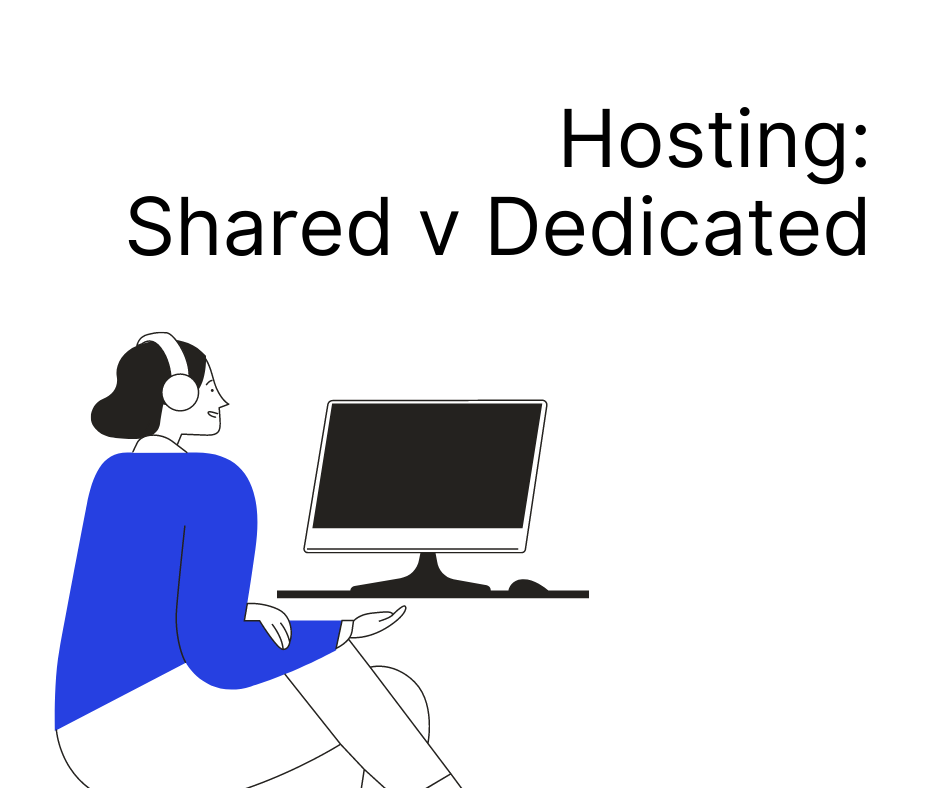Shared v Dedicated Hosting

Hosting is a fundamental piece of the puzzle when providing a solid website experience to your online audience. In this article, we discuss some of the factors you need to consider.
Files
Our websites are, at the end of the day, a collection of computers files, comprising of:
- HTML
- CSS
- Images / videos
- WordPress templates / PHP files
- Word Docs/PDFs
- Database files
- XML files such as sitemaps
- etc
Like other computer files you use on a day to day basis, your website files need to reside on a special computer so that they can be useful; i.e. so that they can to be served up to the internet at large.
This special computer is typically called a server which is provided by whatever hosting company you choose.
The hosting company will have a connection to the Internet, and it may well have other network infrastructure (caching, security etc).
Not all hosting companies are equal
It should come as no surprise that there is a vast scale in the quality and pricing of internet hosting.
E.g. a quick Google search shows that GoDaddy offer website hosting from just over $5 a month whereas a dedicated server at Rackspace can cost you hundreds (if not thousands) a month.
Note: our general recommendations for WordPress hosting are CloudWays or Flywheel.
So why the huge difference in cost?
Well, for one thing, certain companies treat website hosting more seriously than other companies. For some companies website hosting is just something extra they can sell you aside from flogging domain names; for other companies fast, secure, reliable hosting is core to their business.
Contention
As a rule of thumb, the more money you spend, the less you need to share with other websites. E.g. on a dedicated server, it’s just your website sat there – it is not fighting with anything else to use the resources of the server (or the network).
Compare this to cheap and cheerful hosting where many, many random websites will be plonked on one server – all competing for the same resources. if one website (which is nothing to do with you) hogs all the CPU, then you (and all other websites on the same server) will suffer.
Worse, if one website (which is nothing to do with you) is hacked, then all other websites on the same server might be comprised.
Cheap hosting comes at a cost.
Speed
This article started because I was actually writing a piece on measuring your website speed (that article will come next and I’ll try to remember to link back to it here!); however, I found I needed to explain more about hosting and I didn’t want to overburden that article so I’ve split it out here.
As you know now, the quality of the hosting has a dramatic effect on the reliability and speed of your website.
Speed comes down to pretty much this:
When someone types in your website address into the browser address bar, how long does it take before they are presented with a usable website?
Now the curveball here is this: it’s not easy for humans to objectively test website speed with our own eyes. For example, if we load our website onto poor hosting and, after struggling with files & configuration etc, we finally get the site to appear in our web browser, we are relieved and think it is job done.
Because our website appears in the browser, we are not consciously aware that there are actual speed issues in play, and these issues do impact greatly on the user experience of our website visitors, conversion, as well as Google & SEO.
This is why we need to use tools to help measure website speed (discussed in an upcoming article).
The End
The hosting situation is actually more complicated than simply shared v dedicated, as we have much more exotic models now which allow for the fact of computer virtualisation (basically this is computers running computers); approaches like this afford better compartmentalization of websites, and better scalability (at a usage charge).
One final point on hosting, if you have issues, you can always migrate away – yes it’s not a trivial task but, at the same time, it is not Moon landing complexity either. If you need help with your hosting (especially WordPress), please get in touch.
Joel
p.s. if you would like to discuss this article or any other WordPress/website topic – feel free to join our Facebook group (live events every 2 weeks).
Tags: hosting
No Comments
